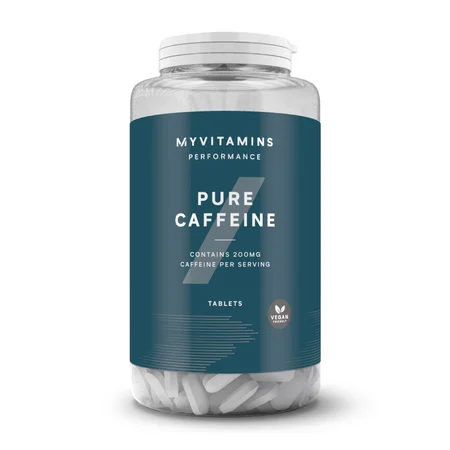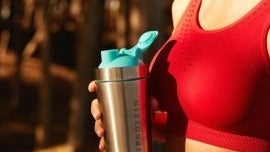Pre-Workout Caffeine | Benefits & Side Effects

When it comes to training, how effective is pre workout caffeine?

What are the Benefits of Pre-workout Caffeine?
Caffeine works by promoting excitability within the spinal cord, and by muscle fibre recruitment.
Furthermore, it decreases our perception of fatigue and muscular pain. This means that it can provide us with a whole host of benefits.
Improved alertness
Caffeine causes the release of dopamine, a chemical in the brain which stimulates the areas of your grey matter.
In addition to increasing dopamine levels, caffeine also blocks receptors for adenosine, the signalling molecule that promotes sleep in the body.
Relieves muscular pain
Caffeine is one of the main ingredients in many pain relievers. It’s been shown that caffeine can help alleviate post-workout pain and muscle soreness, meaning you’ll be able to hit the gym just as hard each day.1 This makes caffeine an ideal supplement to take pre workout.
Improves speed and endurance
Consuming pre workout caffeine before a workout can improve both your speed and stamina while making your workout seem easier and less strenuous!
Speeds up heart rate
Since caffeine has an effect on your central nervous system, it could help you by increasing your heart rate and breathing rate.
Replenishes glycogen stores
Caffeine, when consumed with carbohydrates, has been shown to replenish muscle glycogen stores quickly after exercise.
Side Effects of Caffeine
As with most things, caffeine isn’t all good; there are some ‘side effects’, or negatives which it can present.
Dehydration
Caffeine has been shown to lead to dehydration, as it can have a slight diuretic effect. Therefore, if you’re consuming reasonably high levels of caffeine throughout the day, it’s recommended to increase your water intake to reduce the risk of dehydration. If you take pre-workout caffeine, then you should definitely ensure you keep drinking water throughout your workout.
Insomnia
Some may not be hindered by caffeine when it comes to sleeping, but for others, it could be an issue. You should moderate your intake if you recognise that it affects you negatively and do not drink caffeinated drinks in the evening or before you go to bed.
Addiction
Caffeine can be very addictive – withdrawal from caffeine can present side effects such as headaches, anxiety and cravings. These can be prevented by gradually weaning yourself off, lowering your dosage.
Dosage
Below are the caffeine contents of several popular drinks and foods:
Espresso – 100mg
Instant coffee – 65-100mg
Energy drink – 80mg
Diet Coke – 45mg
Tea – 30mg
Dark chocolate (30g) – 20mg
Green tea – 15mg
Pre-Workout Caffeine
Caffeine is recommended for having as a pre-workout, as it can provide a brilliant energy boost to help push you through your workout. Ensure you do not take it too late in the day, so it does not hinder your sleep.
Caffeine can be purchased in supplement form as tablets, or in powders. It is also a key ingredient in most pre-workouts.

Take Home Message

Claire is a Registered Dietitian through the Academy of Nutrition and Dietetics and a board-certified Health and Wellness Coach through the International Consortium for Health and Wellness Coaching. She has a Bachelor of Science in Biology and a Master’s degree in Clinical Dietetics and Nutrition from the University of Pittsburgh.
Talking and writing about food and fitness is at the heart of Claire’s ethos as she loves to use her experience to help others meet their health and wellness goals.
Claire is also a certified indoor cycling instructor and loves the mental and physical boost she gets from regular runs and yoga classes. When she’s not keeping fit herself, she’s cheering on her hometown’s sports teams in Pittsburgh, or cooking for her family in the kitchen.
Find out more about Claire’s experience here.










